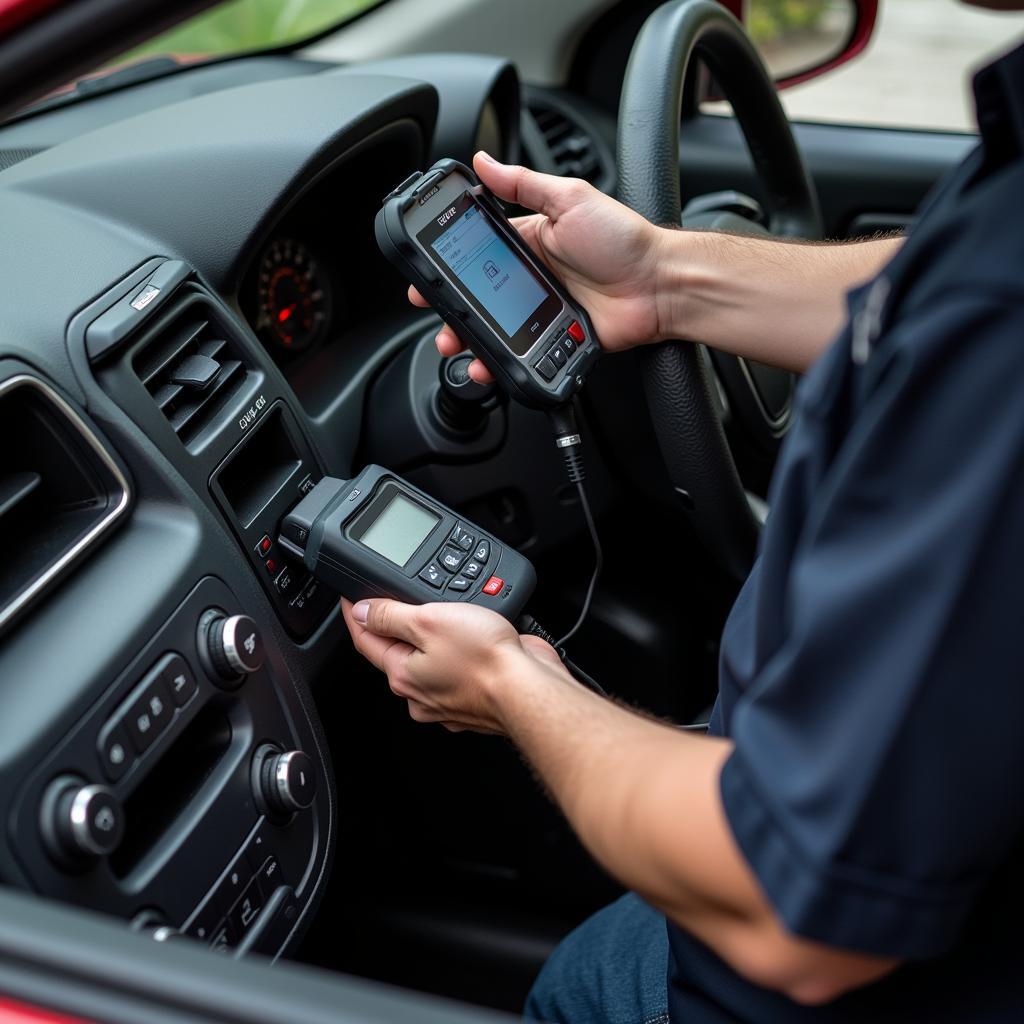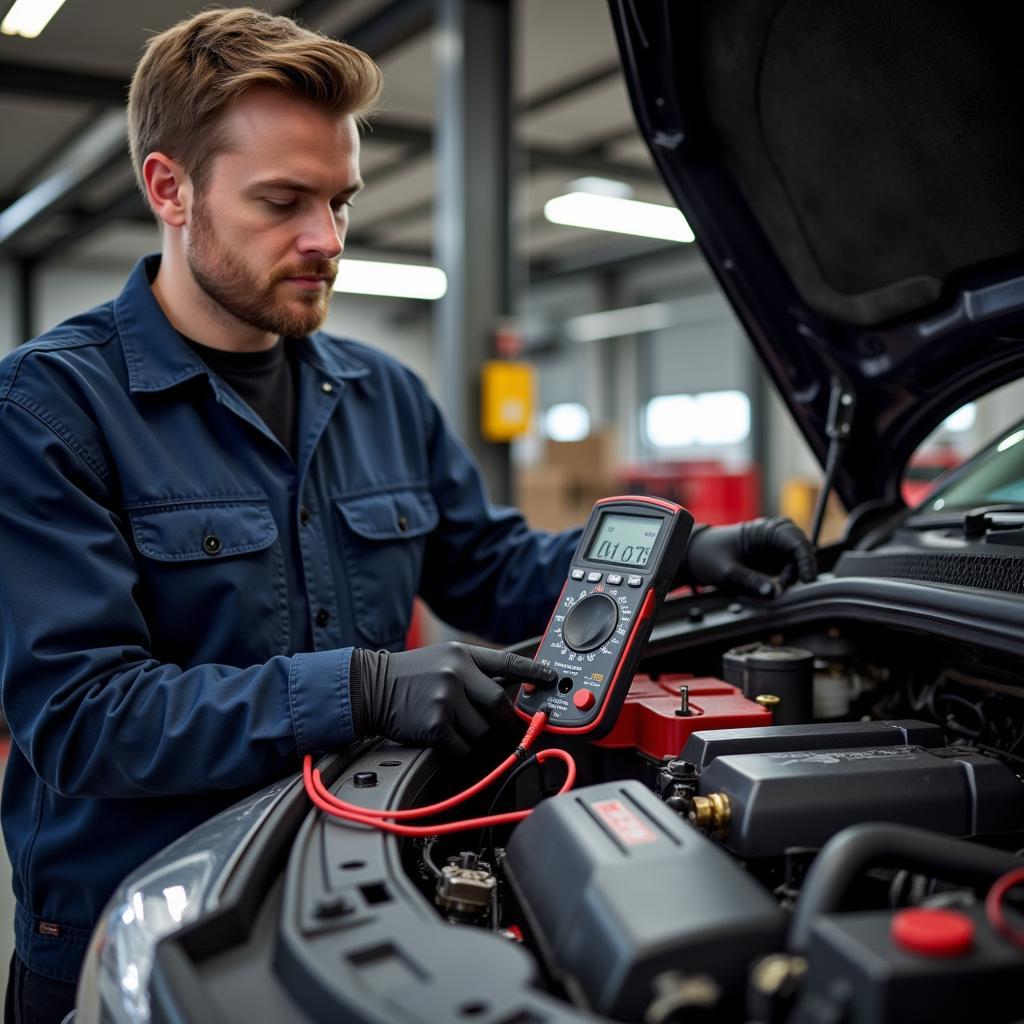Car troubles are never fun, especially when you’re unsure what’s wrong. A faulty alternator can cause a range of issues, leaving you stranded with a dead battery. But can car diagnostics actually pinpoint this common culprit? In this article, we’ll delve into the world of car diagnostics and explore their capabilities in detecting a faulty alternator.
Understanding Car Diagnostics and Alternator Function
Before we dive into the specifics, let’s clarify what car diagnostics and alternators do.
Car diagnostics are essentially the computer system within your vehicle. They continuously monitor various systems and components, including the engine, transmission, and emissions. When a problem arises, the system stores a diagnostic trouble code (DTC) that mechanics can retrieve using a diagnostic scanner.
 Car Diagnostic Scan Tool
Car Diagnostic Scan Tool
The alternator is a critical component that generates electricity to power your car’s electrical systems and recharge the battery while the engine is running. It ensures a consistent flow of power to keep everything functioning smoothly.
So, Can Diagnostics Detect a Faulty Alternator?
The answer is: it depends. While car diagnostics are incredibly sophisticated, they don’t always directly identify a faulty alternator. Here’s why:
- Indirect Detection: Diagnostics primarily focus on communication signals within the car’s electrical system. A failing alternator might not always trigger a direct DTC related to the alternator itself. However, it can cause voltage fluctuations that impact other systems, leading to DTCs related to those affected components.
- Battery Voltage Monitoring: Most modern car diagnostic systems can monitor battery voltage. If the alternator isn’t charging correctly, the battery voltage will drop, potentially triggering a DTC related to low voltage or charging system issues.
- Charging System Codes: In some cases, car diagnostics can generate specific codes related to the charging system, such as “charging voltage too low” or “alternator output low.” These codes directly point toward a potential alternator problem.
Signs of a Faulty Alternator Beyond Diagnostics
While car diagnostics can provide valuable clues, it’s crucial to be aware of other common symptoms that may signal a failing alternator:
- Dimming or Flickering Lights: If your headlights or interior lights dim or flicker, especially when accelerating or using electrical components, it could indicate the alternator is struggling to keep up with the electrical demand.
- Warning Lights: Keep an eye on your dashboard. A lit battery warning light or a charging system warning light often signifies an alternator issue.
- Strange Noises: A failing alternator might produce whining or growling sounds, particularly when the engine is idling.
- Difficulty Starting: If your car struggles to start or requires frequent jump-starts, it could be due to the alternator not adequately recharging the battery.
- The Smell of Burning Rubber: A burning smell coming from under the hood can indicate an overheated alternator, often caused by a worn-out belt or internal problems.
what is diagnostic testing on cars
What to Do if You Suspect Alternator Problems
If you encounter any of the above symptoms or receive DTCs related to voltage or charging issues:
-
Consult a Qualified Mechanic: A professional mechanic can perform a thorough inspection, including a battery and alternator test using specialized equipment. They can accurately diagnose the problem and recommend the appropriate course of action.
-
Don’t Delay Repairs: Ignoring alternator problems can lead to more severe issues, including a complete breakdown or damage to other electrical components. Addressing the issue promptly can save you from potential headaches and costly repairs down the line.
 Mechanic Testing Car Battery
Mechanic Testing Car Battery
Conclusion
Car diagnostics can be valuable in detecting a faulty alternator, but they might not always provide a direct diagnosis. By understanding how diagnostics work in conjunction with recognizing common alternator failure symptoms, you can take the necessary steps to ensure your car’s electrical system stays in top shape. Remember, regular maintenance and timely repairs are crucial for keeping your vehicle running smoothly and avoiding unexpected breakdowns.
FAQs
Can a car run with a bad alternator?
Your car can run for a short time on battery power alone, but once the battery is drained, the engine will stall.
How long does an alternator last?
Alternators typically last between 7-10 years or around 100,000 miles, but their lifespan can vary depending on usage and driving conditions.
How much does it cost to replace an alternator?
Alternator replacement costs can range from $300 to $800 or more, depending on the make and model of your vehicle and labor costs in your area.
Can a bad battery cause alternator problems?
While a bad battery won’t directly damage the alternator, it can put extra strain on it, potentially shortening its lifespan.
Can I jumpstart my car if the alternator is bad?
Yes, you can jumpstart your car with a bad alternator, but it will only provide temporary power, and the engine will likely stall once the battery power is depleted.
How can I prevent alternator problems?
Regular car maintenance, including battery inspections and keeping the alternator belt properly tensioned, can help prevent premature alternator failure.
Is it safe to drive with a bad alternator?
Driving with a bad alternator is not recommended as it can lead to a complete loss of power, potentially causing a hazardous situation. Seek immediate assistance from a qualified mechanic.
Need help diagnosing car problems? Contact us via WhatsApp: +1(641)206-8880 or Email: [email protected]. Our team is available 24/7 to assist you.

Leave a Reply